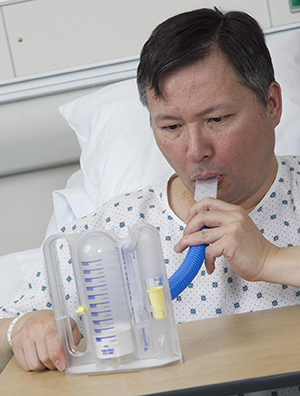After the procedure, you may need to stay in the hospital for
In the hospital
After your procedure, you are sent to a recovery room. There, you will recover from the anesthesia. To help keep your lungs clear and prevent infection, a healthcare provider teaches you a breathing exercise. This is called incentive spirometry. This method helps you take deep breaths. This may help reduce the risk of lung problems that can occur after chest or belly (abdominal) surgery. Your provider can tell you how often to use this tool. In some cases, a nurse or other provider helps you get up and walk or sit in a chair. They'll do this soon after the procedure. This keeps your blood moving. It also helps prevent infection and blood clots.
At home
When you are home:
-
Don't lift more than
5 to 10 pounds as directed by your provider. -
Limit strenuous activity as directed by your provider.
-
Take pain medicine and other medicines only as directed.
-
Return to work and drive a car only when your provider says it’s OK.
-
Keep doing incentive spirometry as often as directed.
-
Follow all instructions for wound care.
-
If you smoke, quit. If you need help stopping smoking, talk with your provider.
-
Stay away from secondhand smoke. Don't let people smoke in your house or car.
When to call your healthcare provider
Call your provider right away if any of these occur:
-
Redness, drainage, or swelling of skin at incision sites
-
Uncontrolled or increased pain
-
Chest pain when you breathe or cough
-
Fever of
100.4 º F (38 °C ) or higher, or as directed by your provider -
New symptoms
Call 911
Call 911 if any of these occur:
-
Trouble breathing or swallowing
-
Sudden shortness of breath
-
Wheezing
-
Cool, moist, pale, or blue skin
-
Hoarse voice or trouble speaking
-
Confusion
-
Very drowsy or having trouble waking up
-
Fainting or loss of consciousness
-
Fast heart rate
-
Feeling dizzy or weak or a sudden drop in blood pressure
-
Feeling of doom
Getting your test results
It will likely take a few days to get back your test results. Your healthcare provider will discuss the results with you in detail. Share any questions or concerns you have with your provider. Write down your concerns. Bring the list with you. Then you won't forget them during your appointments.
If you have lung cancer
You may be referred to one or more cancer specialists. This is for more testing and to discuss treatment. This might include a cancer specialist (medical oncologist) who directs chemotherapy. Or a cancer specialist who manages radiation therapy (radiation oncologist).
If you have another lung or chest problem
Your healthcare provider will discuss treatment with you. If you're given medicine, follow instructions carefully. It's important to make and keep all follow-up visits. This is so your healthcare team can check your health.
Be prepared at your appointments
-
Write down any questions you have. Bring them to your specialist or follow-up appointments.
-
Bring a family member or friend to these appointments. They can be a great support. They can also help you remember the answers to your questions and other information discussed.


